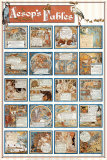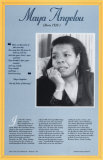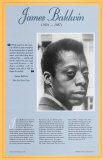|
|
|
|
|
|
|
|
|
James Baldwin
b. 8-2-1924; New York City
d. 12-1-1987
“White people in this country will have quite enough to do in learning how to accept and love themselves and each other, and when they have achieved this -- which will not be tomorrow and may very well be never -- the Negro problem will no longer exist, for it will no longer be needed.” - The Fire Next Time
James Baldwin is known for his writings about African Americans living in a world controlled mainly by whites. His novels, essays and plays made him a key figure in the civil rights movement of the 1960s. James Arthur Baldwin was born in Harlem in New York City, the first of his family's nine children. By his early 20s, he was writing essays that were published in several national magazines. His first novel, Go Tell It on the Mountain (1953), is about the troubles of a black family and is based somewhat on his own youth and the painful relationship he had with his stepfather. In 1955, he published Notes of a Native Son, his first book of essays. Notes of a Native Son focused on the poverty and prejudice constantly faced by many African Americans. Two other essay collections, Nobody Knows My Name (1961) and The Fire Next Time (1963), contain some of his most powerful writing about the struggles between blacks and whites. His other books about racial tensions and bigotry include Another Country (1962), Tell Me How Long the Train's Been Gone (1968), and the play Blues for Mr. Charlie (1964). He also wrote short stories and children's books. He died at the age of 63.
• more James Baldwin posters
|
|
|
|
|
|
|
Edward Wilmot Blyden
b. 8-3-1832; Saint Thomas, US Virgin Isl
d. 2-7-1912; Freetown, Sierra Leone
Edward Wilmot Blyden, an educator, writer, diplomat, and politician in Liberia and Sierra Leone, is regarded as the “father of Pan-Africanism”. His major work, Christianity, Islam and the Negro Race (1887), pushed forward the idea that “Islam has a much more unifying and fulfilling effect..., an idea that would play a major role in the 20th-century revival of Islam” among African-Americans.
|
|
|
|
|
|
|
|
|
|
Gwendolyn Brooks
b. 6-7-1917; Topeka, KS
d. 12-3-2000; Chicago (cancer)
Gwendolyn Brooks, poet and teacher of creative writing, was awarded the 1950 Pulitzer Prize, received a National Book Foundation Medal for Distinguished Contribution to American Letters, and was appointed Poet Laureate Consultant in Poetry to the Library of Congress in 1985.
Gwendolyn Brooks quotes ~
• “I am a writer perhaps because I am not a talker.”
• “Very early in life I became fascinated with the wonders language can achieve. And I began playing with words.”
• “Writing is a delicious agony.”
• “Reading is important - read between the lines. Don't swallow everything.”
• “Poetry is life distilled.”
• “Each body has its art...”
• “One reason that cats are happier than people is that they have no newspapers.”
• Selected Poems, Gwendolyn Brooks
• Essential Brooks CD (Audio CD)
|
|
|
|
William Wells Brown
b. 11-6-1816; Lexington, KY
d. 11-6-1884; Chelsea, MA
Escaped slave William Wells Brown rose to prominence as an abolitionist lecturer, novelist, playwright, and historian. Brown, a pioneer in several literary genres that includied travel writing, fiction, and drama. His first novel was Clotel, or The President's Daughter.
He was an almost exact contemporary of Frederick Douglass, with whom he feuded publicly.
William Wells Brown quotes ~
• “The duty I owe to the slave, to truth, and to God, demands that I should use my pen and tongue so long as life and health are vouchsafed to me to employ them, or until the last chain shall fall from the limbs of the last slave in America and the world.”
• “The last struggle for our rights, the battle for our civilization, is entirely with ourselves.”
• “People don't follow titles, they follow courage.”
• “All I demand for the black man is, that the white people shall take their heels off his neck, and let him have a chance to rise by his own efforts.”
|
|
|
|
Charles W. Chestnutt
b. 6-20-1858; Cleveland, OH
d. 11-15-1932 (heart attack)
Novelist and short-story writer Charles W. Chesnutt broke new ground in American literature with his pioneering use of Arican-American folklore and candid exploration of racial identity.
Chestnutt was the son of free people of color (his paternal grandfather was a white slaveholder) and he could have “passed for white” by appearance but chose not to.
The NAACP awarded the Spingarn Medal to Chestnutt in 1928.
|
|
|
|
Ellen Craft
1826-1897; Clinton, GA
Ellen Craft and her husband William Craft escaped from Macon, Georgia to the North in December 1848 by traveling openly by train and steamboat, arriving in Philadelphia on Christmas Day. Ellen, the daughter of mixed race slave Maria and her white master, posed as a white male planter and William as her personal servant.
The Crafts went to England after the Fugitive Slave Act of 1850 was passed, and lived there for nearly 20 years. After the Civil War they returned to the United States with three of their five children, founding a co-operative farm school in 1873 for the education and employment of freedmen.
Both Ellen and William are credited as authors of a written account, Running a Thousand Miles for Freedom; Or, The Escape of William and Ellen Craft from Slavery.
|
|
|
|
Countee Cullen
b. 3-30-1903; New York or Baltimore
d. 1-9-1946
Countee Cullen was a celebrated writer who wrote some of the most beautiful and beloved poems of the Harlem Renaissance. Little is known about his early life. Born Countee Porter, he was raised in New York City by a woman who was probably his grandmother. She died when he was 15 years old, and he was adopted into the home of Reverend Frederick Ashbury Cullen, the pastor of one of Harlem's biggest churches. Countee took the last name of his new family. While he was attending DeWitt Clinton High School he became well known for his poetry. One of only a handful of African American students at Clinton, Cullen won honors in five different subjects.
Cullen went on to study at New York University where his poetry won him both awards and friendships in Harlem's writing community. Before he graduated college with honors in 1925, he had signed a contract to publish his first book of poems, Color. Cullen wrote his poems in very traditional forms such as the sonnet and the lyric ballad, but his themes were far from traditional. He wrote about injustice and prejudice as well as more “classical” topics, and his reputation grew with every new book. Cullen was close with most of the important figures of the Harlem Renaissance, and he was even briefly married to W.E.B. Du Bois' daughter, Nina Yolande.
Cullen wrote several books of poetry, a novel, a popular play, and two children's books. He also taught junior high school. (One of his students, James Baldwin, would grow up to be a famous writer himself.) Countee Cullen died suddenly in 1946, but his legacy lives on: One of the oldest branches of the New York City Public Library is named for him.
• Stars of the Harlem Renaissance posters
• Poetry Forms posters
• Caroling Dusk: An Anthology of Verse by Black Poets in the Twenties, editor Countee Cullen
|
|
previous page | top | next
black history > Black Writers Index > A-C | d | e-g | h-i | j-n | o-t | w-x
|
|
I have searched the web for visual, text, and manipulative curriculum support materials - teaching posters, art prints, maps, charts, calendars, books and educational toys featuring famous people, places and events - to help teachers optimize their valuable time and budget.
Browsing the subject areas at NetPosterWorks.com is a learning experience where educators can plan context rich environments while comparing prices, special discounts, framing options and shipping from educational resources.
Thank you for starting your search for inspirational, motivational, and educational posters and learning materials at NetPosterWorks.com. If you need help please contact us.
|
|
|























